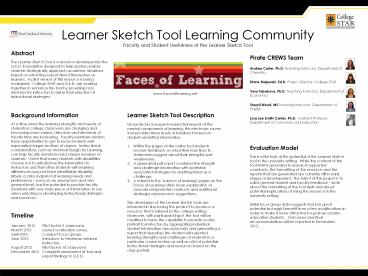Learner Sketch Tool Learning Community - PowerPoint PPT Presentation
1 / 1
Title:
Learner Sketch Tool Learning Community
Description:
Learner Sketch Tool Learning Community Faculty and Student Usefulness of the Learner Sketch Tool Abstract The Learner Sketch Tool is a resource developed by the Q.E.D ... – PowerPoint PPT presentation
Number of Views:86
Avg rating:3.0/5.0
Title: Learner Sketch Tool Learning Community
1
Learner Sketch Tool Learning Community Faculty
and Student Usefulness of the Learner Sketch Tool
Abstract The Learner Sketch Tool is a resource
developed by the Q.E.D. Foundation designed to
help postsecondary students strategically
approach academic situations based on what they
report about themselves as learners. A pilot
version of this resource is being evaluated.
College STAR and Q.E.D. are working together to
enhance this tool by providing class sketches for
instructors to aid in their selection of
instructional strategies.
Pirate CREWS Team Andrea Carter, Ph.D. Teaching
Instructor, Department of Chemistry Diane
Majewski, Ed.D. Project Director, College
STAR Vera Tabakova, Ph.D. Teaching Instructor,
Department of Economics Sheryll Wood, MS Teaching
Instructor, Department of English Lora Lee Smith
Canter, Ph.D. Assistant Professor, Department of
Curriculum and Instruction
www.facesoflearning.net
Background Information At a time when the
learning strengths and needs of students in
college classrooms are changing and becoming more
varied, class sizes and demands of faculty time
are increasing. Faculty members seldom have
opportunities to get to know students well,
especially in larger sections of classes.
Instructional considerations, such as Universal
Design for Learning, can help faculty members
reach larger numbers of students. Given that
many students with disabilities choose not to
self-disclose this information to instructors and
that other students with learning differences may
not have identifiable disability labels, a class
snapshot of learning needs and preferences even
on an anonymous and very general level- has the
potential to provide faculty members with one
more piece of information to use when selecting
or developing instructional strategies and
resources.
- Learner Sketch Tool Description
- Grounded in a research-based framework of the
mental components of learning, this electronic
survey tool provides three levels of feedback
based on student-submitted information. - Within the pages of the online tool students
receive feedback on what their reactions to
statements suggest about their strengths and
weaknesses. - A generated pdf report combines the strength and
challenge information with potential associated
strategies for anything listed as a challenge. - A referral to the "science of learning" pages on
the Faces of Learning offers more explanation of
neurodevelopmental constructs and additional
strategies and resource suggestions. - The developers of the Learner Sketch Tools are
interested in fine tuning the product to produce
a resource that is tailored to the college
setting. Moreover, with participant input, the
tool will be modified to have the capability to
provide a class portrait to instructors by
aggregating individual student information
(anonymously) and generating a report that
describes the student self-reported learning
strengths and challenges of students in a
particular course section as well as a list of
potential instructional strategies and resources
based on this class portrait.
Evaluation Model This is a first look at the
potential of the Learner Sketch tool in the
university setting. While the content of the
tool itself is grounded in research-supported
constructs, the formatting of the resource and
the reports that are generated are currently
still in early stages of development. The intent
of this project is to solicit general student and
faculty feedback both about the formatting of
the tool itself and about potential implications
of using the resource in the university setting.
Initial focus group data suggests tool has
great potential but might benefit from a few
modifications in order to make it more attractive
for post-secondary education students. Outcomes
and final recommendations will be reported in
December, 2012.
Timeline January 2012 Pilot tool in 5
classrooms March 2012 Launch evaluation
survey April 2012 Conduct focus groups June
2012 Introduce to Freshman Seminar
Instructors August 2012 Pilot tool in 10
classrooms December 2012 Complete assessment of
tool and report findings to Q.E.D.































